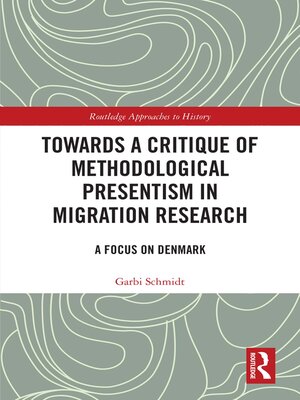Towards a Critique of Methodological Presentism in Migration Research
ebook ∣ A Focus on Denmark · Routledge Approaches to History
By Garbi Schmidt

Sign up to save your library
With an OverDrive account, you can save your favorite libraries for at-a-glance information about availability. Find out more about OverDrive accounts.
Find this title in Libby, the library reading app by OverDrive.



Search for a digital library with this title
Title found at these libraries:
| Library Name | Distance |
|---|---|
| Loading... |
This book investigates the benefits of integrating history, sociology, and ethnography to better understand migration and its consequences, using Denmark's history of migration as a case study.
Although migration research is an interdisciplinary field, much research on migration still occurs in disciplinary containers. The field is not least affected by a methodological presentism: a scholarly and societal tendency to understand social phenomena within a limited contemporary framework, neglecting possible effects and similarities embedded in and established through human history. This book builds upon previous research underscoring the importance of examining migration from a longer, diachronic, and genealogical viewpoint, and it is among the first to advocate for a more profound methodological discussion regarding how, why, and when this should be addressed. This book's analysis draws on empirical examples from Denmark, a Northern European country where the impact of migration is currently hotly debated, yet the history of migration is frequently overlooked. Specific themes examined in the book range from demography/immigrant statistics to the understanding of "the ghetto," the implications of discussions around "Danishness," and how migration has influenced and molded a particular neighborhood in Copenhagen (Nørrebro) over time.
This volume is innovative and pertinent for an international audience of researchers and students interested in the genealogies of migration and eager to explore new pathways for pursuing this research interest.







